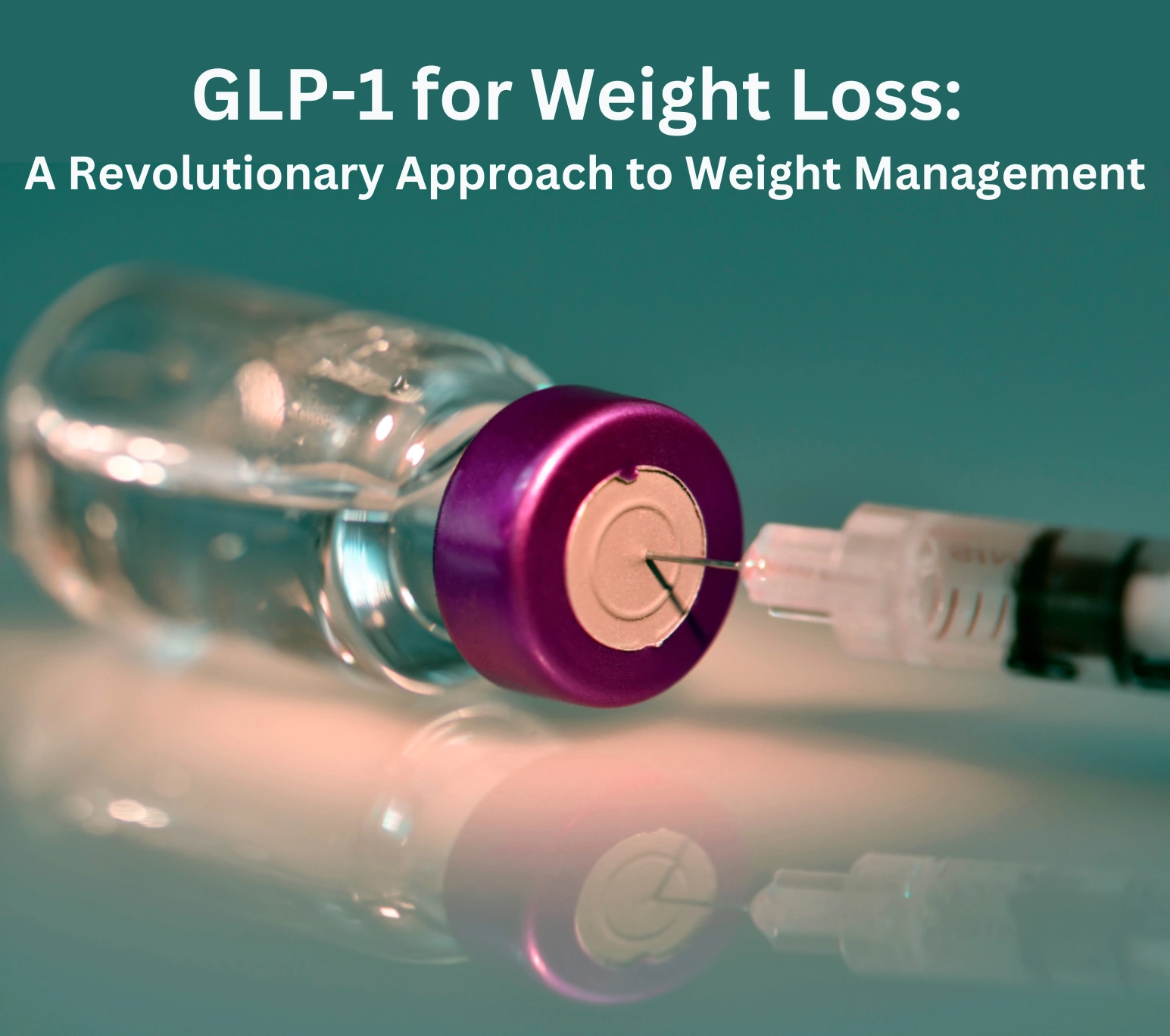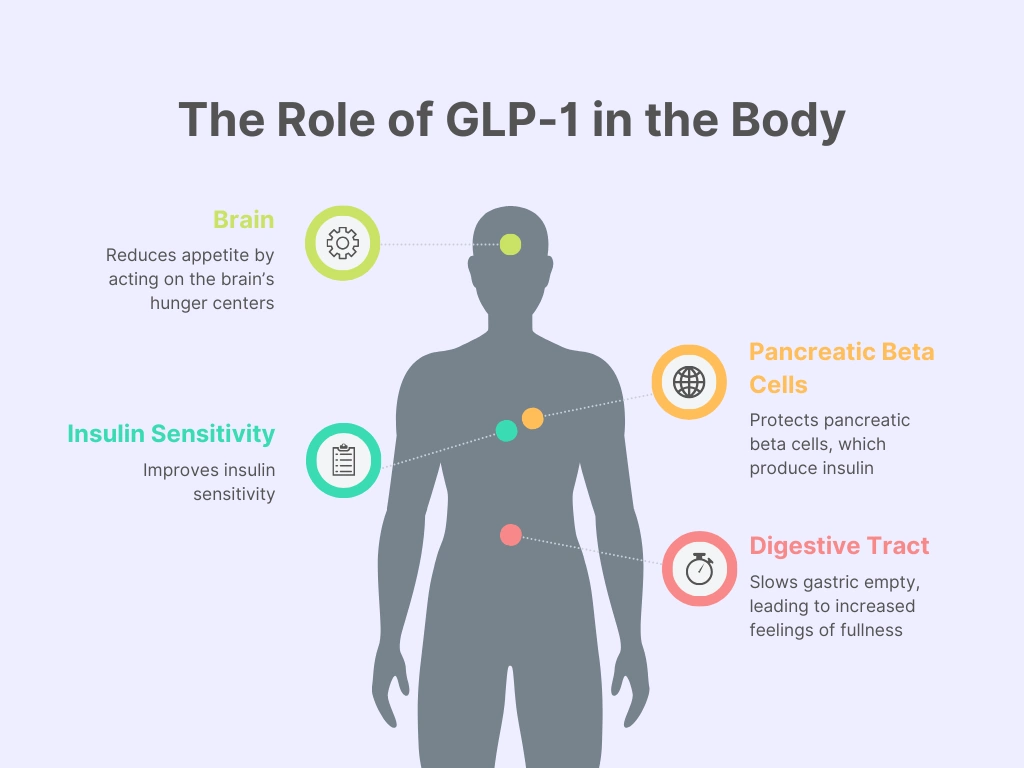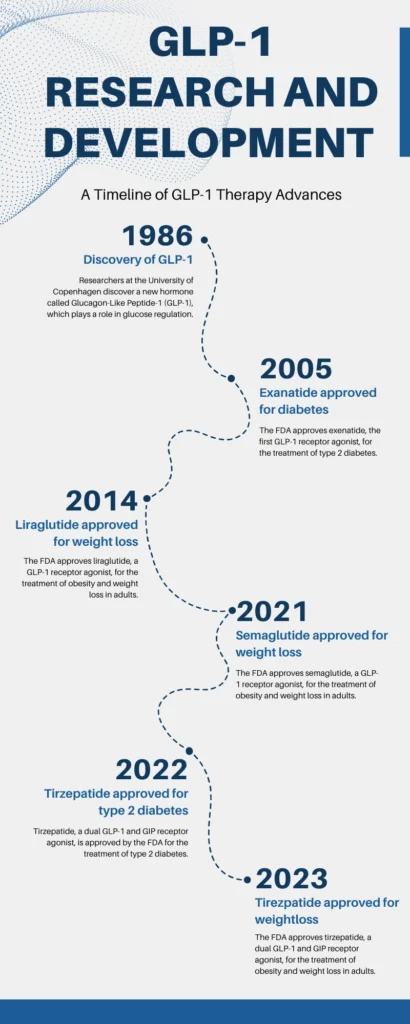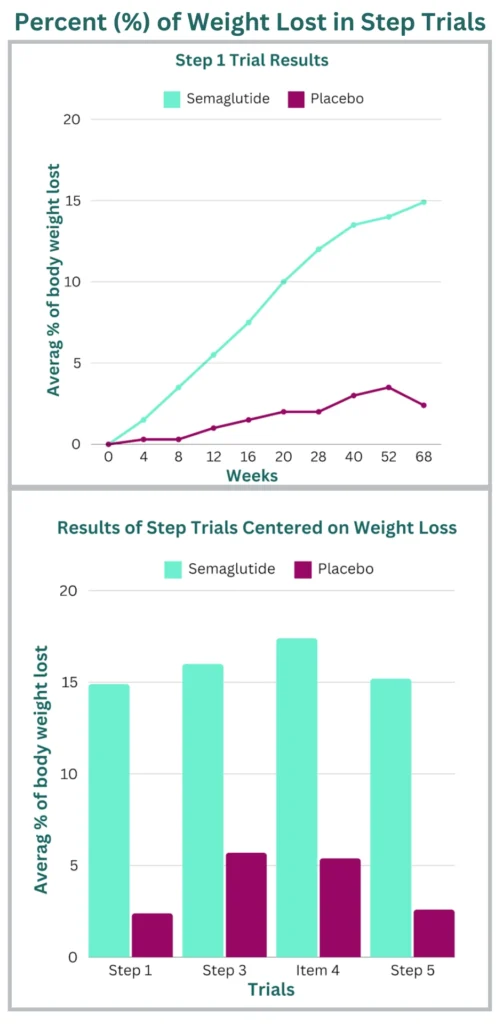
Introduction to Weight Management w GLP-1 therapy
Are you stuck and feeling like your body’s working against you in your weight loss journey? Trust me, we’ve all been there. If you’re tired of that constant battle with the scale, there’s some good news! A secret weapon that works with your body instead of against it has emerged. This potential ally, GLP-1, could really turn things around!
Now, I know what you’re thinking, “GLP-what? Another weight loss miracle? Yeah, right.” But hang with me for a sec. GLP-1 therapy isn’t some fad diet or magic pill so don’t worry. It’s a tiny molecule that could be the key to unlocking your weight loss goals. Hamilton Health & Wellness is in your corner with all the updates on this exciting approach to weight loss & maintenance.
In recent years, GLP-1 injectables has emerged as a game-changer in the field of weight management. Remember that origin story we were teasing? GLP-1, or Glucagon-Like Peptide-1 if we’re being fancy, started as a humble hormone helping to manage blood sugar. It’s actually a hormone your body already makes and the medical community has figured out how to harness its power to help with weight management. Originally discovered as a hormone involved in regulating blood sugar levels, GLP-1 therapy has now taken center stage in the fight against obesity. Sounds like a valuable team player to us!
Let’s dive into the fascinating world of GLP-1. We’ll chat about its history, how it works its magic, and why it’s got researchers and medical professionals (like us) so excited.
What is GLP-1?
Think of GLP-1 as your body’s own appetite control system, produced right in your gut. It belongs to a family of hormones called incretins, which play a crucial role in regulating blood sugar levels and appetite. GLP-1 is like that friend who reminds you when you’ve had enough to eat and helps you make better food choices–except it’s not telling you this over a plate of nachos and 2-for-1 margaritas.
The Role of GLP-1 in the Body
Beyond its effects on blood sugar, GLP-1 is quite the multitasker:
1. It slows down how quickly food leaves your stomach, making you feel full for longer.
2. It’s like a ‘stop eating’ signal to your brain, reducing your appetite.
3. It helps your body use insulin more effectively.
4. It protects the cells in your pancreas that produce insulin – think of it as a bodyguard for these important cells.

History

For Diabetes
The GLP-1 story started with diabetes management. Scientists noticed that when people ate sugar, their bodies produced more insulin compared to when sugar was injected directly into their blood. This discovery led to identifying GLP-1 in the 1980s.
Fast forward to the early 2000s, and pharmaceutical companies started developing medications that mimic GLP-1 to treat type 2 diabetes. The first of these, exenatide, got the green light from the FDA in 2005.
For Weight Loss
Here’s where it gets really interesting for us weight loss warriors! Patients with diabetes using these GLP-1 mimicking drugs started reporting significant weight loss. This unexpected bonus led researchers to explore using these medications specifically for obesity treatment. In 2014, liraglutide became the first GLP-1 medication approved for weight management in adults with obesity or higher-weight persons with at least one weight-related health issue.
Since then, newer GLP-1 medications like semaglutide have shown even more promising results in weight loss.
Mechanism of GLP-1 in Weight Loss
How GLP-1 Regulates Appetite
We like to think of GLP-1 as a smart thermostat but for your appetite. A smart thermostat will learn your preferences and adjust your home’s temperature according to your patterns, automatically. Like that smart thermostat, GLP-1 tunes into your body’s needs and regulates your hunger signals. It communicates with the appetite control center in your brain, fine-tuning your hunger and fullness cues.
This clever hormone doesn’t just flip an “off” switch on your appetite. Instead, it dials it down gradually, making you feel satisfied with less caloric intake. Think of it as if the thermostat of your hunger is set to “comfortable” rather than “ravenous.” The result? You find yourself naturally eating less, without feeling like you have to give up anything or like you’re locked in a constant battle with your cravings. It’s not about deprivation – it’s about finding your body’s natural balance.
Impact on Metabolism and Energy Expenditure
GLP-1 might also give your metabolism a little boost. Some studies suggest it can increase the number of calories you burn at rest so your body will, in turn, burn more fat. Even if it is a little boost, we will take it–it’s like having a little extra help in your weight loss efforts. Who doesn’t love having that perk?
Effects on Insulin Sensitivity
GLP-1 is an expert at helping your body use insulin more effectively which helps to keep your blood sugar levels stable. By doing this, it can lead to fewer cravings and better overall metabolic health. This is just another way that GLP-1 works indirectly supporting your weight loss efforts and helping prevent weight gain. Another amazing perk, right?
GLP-1 Agonists for Weight Loss
Overview of GLP-1 Agonists
So how do you unlock the potential of this hormone? By working closely with a healthcare provider you can add a new ally to your health journey in the form of GLP-1 agonists for weight loss. GLP-1 agonists are medications that act like your body’s natural GLP-1, but they stick around longer. Think of them as GLP-1 superheroes, fighting the good fight against excess weight for extended periods.
Commonly Used GLP-1 Agonists
Let’s get to the details on those agonists, shall we? Several GLP-1 medications have gotten the thumbs up from the FDA (Zepbound, Mounjaro, Ozempic and Wegovy) for weight management:
1. Liraglutide(Saxenda®): The pioneer in the GLP-1 weight loss world, approved in 2014. It’s a daily injection that typically helps people lose about 5-10% of their body weight. Not too shabby!
2. Semaglutide(Wegovy®): The new kid on the block, and boy, does it pack a punch! It’s a once-weekly injection that’s shown even more impressive results. In studies, people lost an average of 15% of their body weight. That’s like saying goodbye to 30 pounds for a 200-pound person!
3. Tirzepatide(Zepbound®): The latest superstar in the GLP-1 family! While it’s technically a dual GIP/GLP-1 receptor agonist, it’s showing incredible results for weight loss. In clinical trials, people taking Tirzepatide lost up to 22.5% of their body weight. That’s like dropping 45 pounds for a 200-pound person! It’s given as a once-weekly injection and has also shown impressive results in improving blood sugar control.
Administration and Dosage
Most of these medications are given as injections under the skin. Don’t worry – the needles are tiny! We will work with you to make sure you are comfortable and confident, our recommendation is that you start on a low dose and gradually increase it to minimize side effects. It’s like easing into a new exercise routine – you start slow and build up over time.
Clinical Evidence and Efficacy
Results from Clinical Trials
Want to hear the cold-hard facts? Let’s crunch the numbers! The results from studies on these medications are impressive: For example, in one study, people taking Semaglutide lost an average of 15% of their body weight over about 16 months. That’s compared to only 2.4% in the group taking a placebo. It’s like the difference between losing 30 pounds versus 5 pounds for a 200-pound person!
Comparative Studies with Other Weight Loss Medications
When compared to other weight loss medications, GLP-1 agonists shine bright. We recognize that every body is different, but these medications usually lead to more weight loss and have added benefits like improving heart health and helping manage blood sugar levels.
Long-term Efficacy and Safety
The good news is that the weight loss from these medications can be maintained. And while no medication is without risks, the safety profile of these drugs is generally good. The most common side effects are tummy troubles, which often get better over time. We will go over those in a bit more detail later in this post.

Benefits Beyond Weight Loss
Cardiovascular Benefits
We spoke earlier about the little boosts and perks of increased metabolism and helping with insulin sensitivity but here is an ever bigger one we’ve been waiting to share: these medications can be good for your heart too! They’ve been shown to reduce the risk of heart disease and can help lower high blood pressure in many people.
Researchers aren’t stopping there. They’re diving deep into how GLP-1 medications might help protect your heart in even more ways. Some studies are looking at whether these medications could reduce the risk of heart attacks and strokes. It’s like GLP-1 is trying to be your heart’s new best friend!”
Improvements in Blood Sugar Control
If you have type 2 diabetes or are at risk for it, these medications can be particularly helpful. As we mentioned before–they’re great at improving blood sugar control.
Reduction in Blood Pressure
While we are praising all the perks of this medication, we can’t forget to share that many patients find their blood pressure goes down while using these medications. Are you keeping count of all the great boosts? Increased metabolism–check! Help with insulin sensitivity and blood sugar control–check! Possible risk reduction for heart disease–check! Potential reduction of high blood pressure–check!
Potential Side Effects and Risks
Gastrointestinal Issues
Let’s be honest – no medication is perfect. The most common side effects of GLP-1 medications are related to the digestive system:
– Nausea (feeling queasy)
– Vomiting
– Diarrhea
The good news is that these side effects are usually mild to moderate and tend to improve over time as your body gets used to the medication.
Other Side Effects
Some people might experience headaches, dizziness, or reactions at the injection site. It’s always important to discuss any side effects with your healthcare provider. We’re always here to help!
Contraindications and Cautions
These medications aren’t right for everyone. That’s why it’s crucial to work with us! Hamilton Health & Wellness is a team of healthcare professionals who will evaluate your individual situation and medical history before prescribing them.
Integration into Weight Loss Programs
Combining with Diet and Exercise
Think of GLP-1 medications as a powerful tool in your weight loss toolbox – but remember, they work best when combined with a healthy diet and regular exercise. They’re not a replacement for healthy lifestyle habits, but rather a support to help make those habits easier to maintain. If you need a refresher on the foundations of weight loss, we have an entire post detailing Weight Loss & Weight Management: What You Need To Know.
Professional Guidance and Support
Regular check-ins with your healthcare team are super important. We’ll monitor your progress, adjust your treatment if needed, and address any concerns you might have. Think of us as your personal health cheerleaders!
Frequently Asked Questions
1. Q: Will I gain the weight back if I stop taking the medication?
A: It’s possible. These medications work best as part of a long-term weight management plan. The same as if you go to the gym every day for 6 months and then stop- if you go back to your old habits, the weight will naturally return and the muscle mass you built will fade. The idea is that while being on GLP-1 therapy, your habits have significantly changed, your stomach has shrunk and your energy level is up. Maintaining those good habits that you learned while being on GLP-1’s is essential to maintaining the weight once off the medication.
2. Q: Can I take GLP-1 medications if I’m not diabetic?
A: Yes, some GLP-1 medications are approved specifically for weight loss in people without diabetes.
3. Q: How long does it take to see results?
A: Many people start seeing results within the first few months, but the full effect may take longer based on how much weight loss is desired.
Conclusion
Summary of GLP-1’s Role in Weight Loss
GLP-1 agonists represent an exciting advancement in obesity treatment. By targeting multiple aspects of weight regulation – including appetite, metabolism, and blood sugar control – these medications offer a comprehensive approach to weight management.
While GLP-1 sounds exciting (and it is!), it’s important to remember it’s not a magic wand. It works best when you partner with healthcare professionals who can guide you through the process and cheer you on every step of the way!


With a personalized weight loss plan, GLP-1 Medications, and nutritional guidance, we can take charge of your weight loss journey. Your transformation starts here!
Glossary:
-Personalized Weight Loss Plans: Tailored strategies to fit your lifestyle and goals.
–GLP-1 Medications: Prescription and management of GLP-1 therapies that help reduce appetite and promote weight loss.
–Nutritional Guidance: Expert advice on diet and nutrition to complement your weight loss journey.
–Regular Monitoring: Ongoing support to track your progress and adjust your plan as needed.
–Behavioral Support: Counseling and resources to help you develop healthy habits and overcome challenges.
Partner with us to take charge of your weight loss journey in a supportive, convenient environment. Your health transformation starts here!
Want to lose weight and maintain a healthy weight? Check out our in-depth guide to weight loss and management.
Love what you’re reading? Don’t miss out on the latest insights, tips, and inspiration! Subscribe to our blog and get fresh content delivered straight to your inbox.
📬 Be the first to know.
💡 Gain valuable ideas.
🎉 Join a growing community of informed minds.
Fill out the form, submit, and let’s keep the conversation going.🌟
